|
Fishing is one of the oldest industries known to man.
The quays of fishing ports were always bustling places, thick with workers
gutting, salting, processing and selling fish.
Watch some of the earliest moving pictures of Fish
Quay Scenes on Great Yarmouth Quayside in 1902. Men are shown unloading
their catch whilst the fisher girls prepare the fish ready for distribution.
The Docks
Scotch Fisher Girls at Great Yarmouth (1935) shows
the herring girls gutting the fish. They carry baskets and pack the herring
in barrels (kitts) of salt and ice. The whole process was very messy with
fish oils dripping on the increasingly smelly girls as they hung the fish
up ready for packaging.
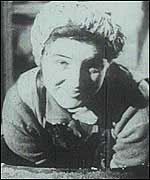 |
|
Herring girls had one of the smelliest
jobs on land |
Herring - Great Yarmouth (1946) provides footage
of the race between fishing boats to get back to port first to unload
and sell the catch. Once on land, see how the herring girls worked quickly
to get the catch ready for sale, and watch the fish being smoked, frozen
and packaged.
A Man's World (1973) shows the ice factory on
shore and loading ice onto trawlers.
Life at sea
Fishing is an incredibly dangerous occupation, seventeen
times more risky than mining, the most dangerous job on land. Arctic
Harvest (date?) shows fishermen working on a moving deck, facing freezing
winds and lashing rain, and the risk of being swept overboard.
The crew were on call 24 hours a day, seven days a week.
Deckhands did much of the hard manual work.
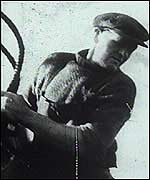 |
|
Trawling for a good catch |
Heroes of the North Sea (1925) shows deep sea
fishermen preparing the trawl using traditional fishing methods.
Trawl Fishing - Lowestoft (1930) illustrates life
on board, the nets being cast and the cramped conditions above and below
deck. The film shows how water poured onto the decks, drenching the men
wearing their smocks as they landed the catch.
Drifting (1949) reveals how fishing was important
to many east coast UK ports from Aberdeen and North Shields in the north
to Great Yarmouth and Lowestoft in the south.
Watch the fishermen prepare their boats and see them
in action in the deep sea fishing grounds. Hauling the nets up was a laborious
and demanding process, starting at 1am and often lasting for over five
hours.
Arctic Waters
Conditions at sea were often treacherous and physically
demanding. Cine films made by deep-sea fisherman Jim Williams provide
a unique insight into fishing 2,000 miles away from home.
Williams' film shot in the Arctic Ocean shows ships contending
with icebergs, iced-up masts and frozen decks.
Fishermen were estranged form their families for weeks
on end and wives became 'fish widows' left to bring up their families
alone. 24 Hours (1968) shows how men often knew no other trade,
and continued to go to sea despite the hardships and family separations.
Arctic Harvest illustrates how ships started to
sail further afield and take more risks in the name of profit. The film
also shows the valuable by-products of fishing including cod liver oil
which was sorted on deck and processed back on shore.
Tragedy at Sea
Fishing is one of the most treacherous of all professions
with death and injury common in an industry that pits man against the
forces of nature.
The Rescue of the Sargon (1948) illustrates the
harrowing tale of the Sargon which capsized in Arctic waters after the
ship's rigging iced up. All of those on board perished (check) including
Jim Williams' uncle who died in the wheelhouse.
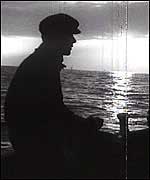 |
Disasters were commonplace
in Arctic waters |
Tragedies were a regular occurrence and everyone in a
fishing community knew someone who has been lost at sea.
In 1968 there was a catastrophic chain of events - three
trawlers from Yorkshire (check) sank in quick succession with the loss
of all hands.
24 Hours (1968) is a BBC film about the loss of
two of the trawlers, the St Romanus and the Kingston Peridot, which disappeared
whilst fishing in Arctic waters.
The trawlers had met with Force 12 gales, mountainous
seas and freezing spray. Interviews with the men's families provide a
poignant reminder of how dangerous deep sea fishing could be.
In the film the families express their anger at the loss
of the ships and the lack of safety precautions on board.
A BBC News story (1968) features women campaigners
lobbying for better safety following the sinking of a third boat, the
Ross Cleveland, in atrocious weather with the loss of xx lives.
Deep Water
Economic survival was always the issue for fishermen
and the trawler owners, but increased competition meant that stocks began
to go into decline.
Whilst the 1920s and 30s had been a period of uncertainty
for the herring industry, the years after the Second World War saw the
herring fishing industry was in decline, and many firms went out of business.
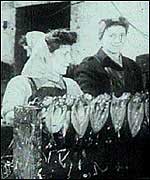 |
|
Herring girls - a dying breed |
Herrings for Sale (1955) is a promotional film
made by Unilever showing older fishing girls at Yarmouth gutting and packing
the herring on the Fish Quay. This was considered to be a 'skilled woman's
job' but mechanisation of the gutting process, seen in the film, was about
to make these women redundant.
Meanwhile the deep sea fisheries continued to prosper
and by the 1950s Grimsby was the world's largest fishing port. It was
the age of 'three day millionaires' when a good catch could make a trawlerman.
But the boom was to be short-lived, and fishermen started
to explore more distant fishing grounds in the search of fresh fish stocks.
It was the beginning of the end…
Cod Wars
By the mid 1960s the Russians, Danes and Norwegians were
hoovering up the sea, and fish stocks were being depleted at an alarming
rate. Jim Williams' cine film shows Russian factory ships trawling
for large catches, and processing the fish at sea.
Panorama (1968) illustrates how the depleting
of fish cod stocks led to the Cod Wars of the late 1960s and early 70s.
The BBC film shows both sides of the cod argument with Icelanders claiming
that a 50 mile limit was needed to guarantee their economic prosperity
and prevent over-fishing.
The documentary also shows the concerns of the British
Trawlers Federation who believed that any exclusion of English trawlers
would jeopardise jobs both at sea and on shore.
The seriousness of the situation resulted in many head-on
clashes. A BBC News film (1976) shows the ramming of the British
trawler the Boston Kestrel by an Icelandic gunboat off the coast of Iceland.
War on the high seas
Skipper Pitts Goes to War (1972) is a remarkable TV documentary
shot during the Cod Wars and covering the exploits of Charlie Pitts including
skirmishes with Icelandic gunboats.
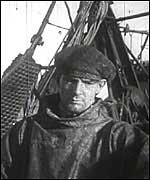 |
|
Murky waters - the Cod War was
the end of the line for the fishing industry |
Filmed on board the trawler Arctic Galliard (check),
the documentary shows skipper Pitts as he sets sail from Hull to Icelandic
fishing grounds.
The film includes footage of incidents between the British
trawler and the Icelandic gunboat Odin (check). In a memorable scene,
the Galliard plays Land of Hope and Glory and Rule Britannia
at the gunboat whilst the crew of the trawler get ready with hoses to
repel any borders, with almost comic overtones.
Uncertain Waters
Charlie Pitts was not the only trawlerman to face an
uncertain future. Behind the scenes, decisions had been made by the British
government to let Iceland win. The new fishing limits were set at 200
miles off the Icelandic coast.
Ports such as Hull and Grimsby were thrown onto the scrapheap.
As a concession, areas of the North Sea were given over exclusively to
British fishermen, but after years of unregulated fishing, there was nothing
left to catch.
Despite this the British Trawler Federation was still
promoting fishing as an exciting, romantic career, full of prospects.
A Man's World (1973) is a recruiting film shot on board a Lowestoft
trawler.
The film shows classroom demonstrations and on-board training,
with the emphasis on combining traditional skills with modern know-how.
Despite the film's upbeat message, the industry was on its knees and was
virtually finished. It was the end of an era.
Today there are just a few remnants of the dying fishing industry. The
films from the depths of the archives provide a fascinating glimpse of
an industry beset by decline from the turn of the century.
|

